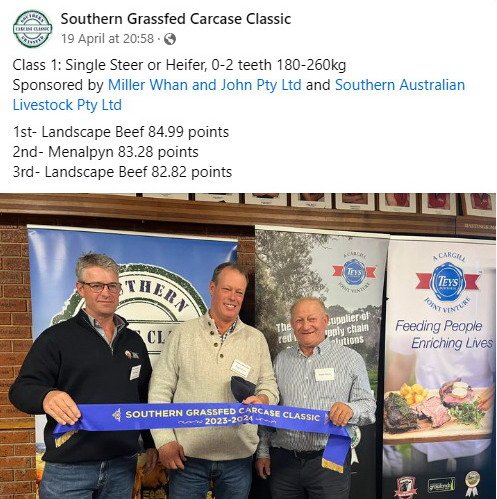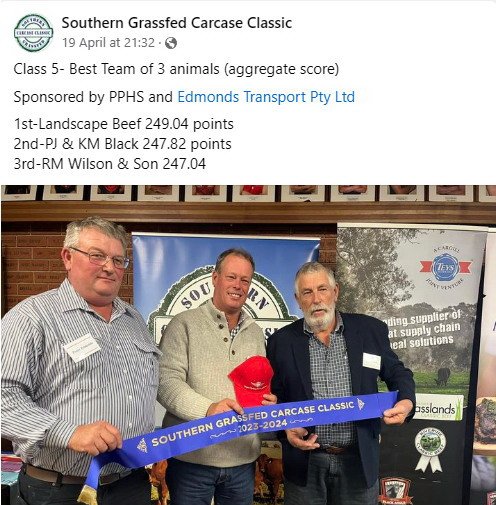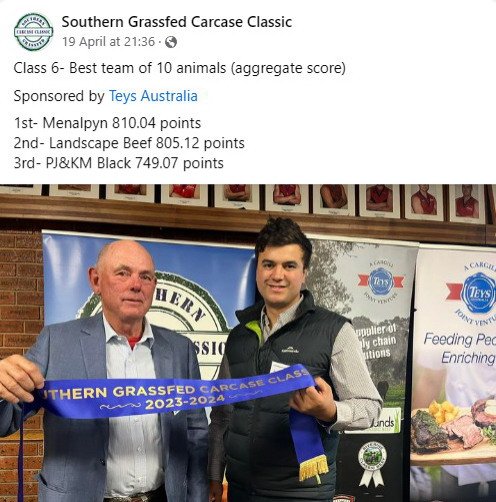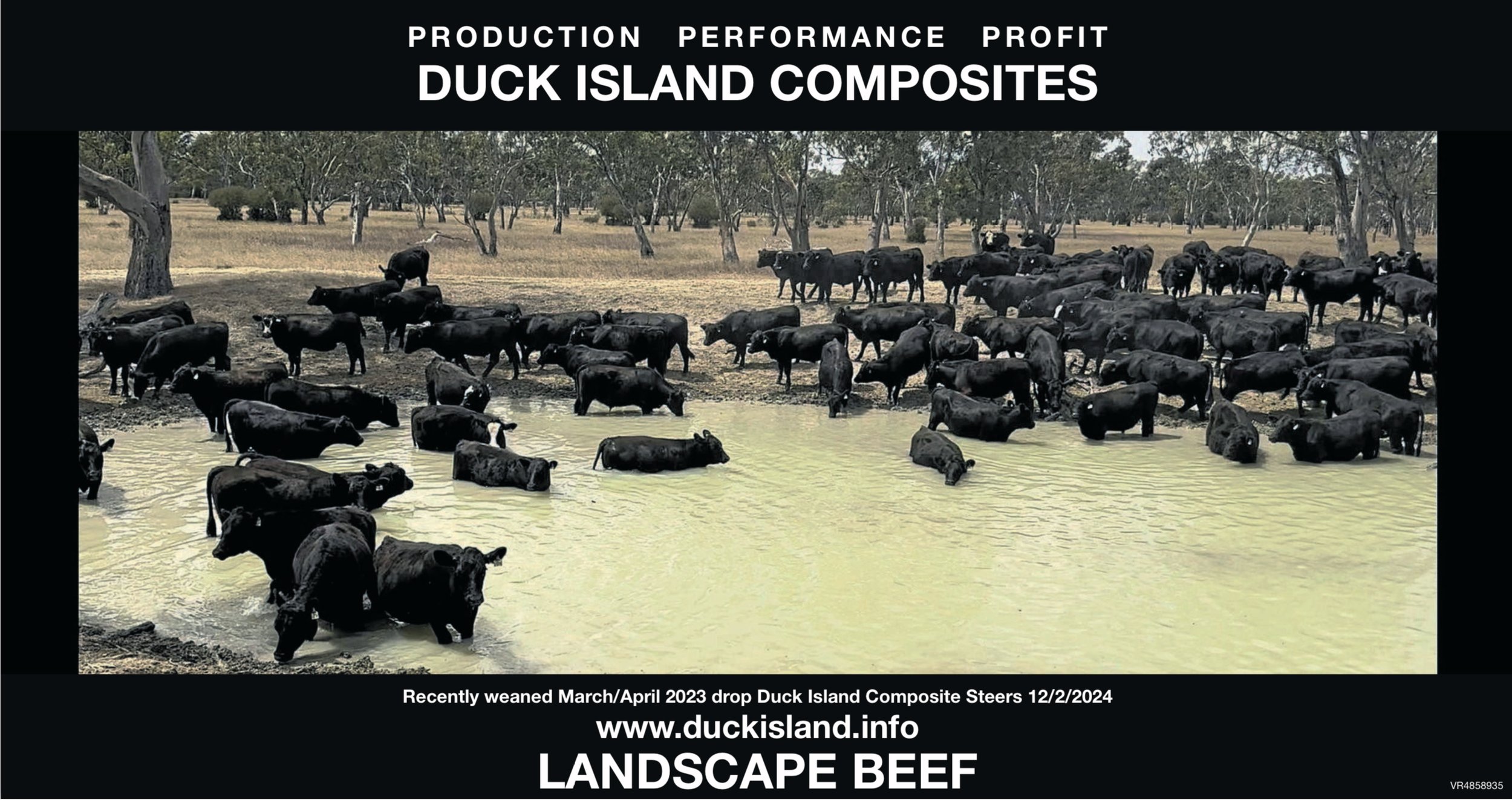DUCK ISLAND COMPOSITES
2024 SOUTHERN GRASSFED CARCASE CLASSIC (SGCC)
Landscape Beef was only able to get 2 B-Double loads into the 2024 SGCC on account of the difficulty on booking available kill space at Teys Naracoorte.
Two high-quality B-Double loads of 21-23 month steers missed out due to not being within the cutoff date of the SGCC.
It was very pleasing to win the best Team of 3 for the second year in a row.
Landscape Beef was second in the Team of 10 animals.
For the first time Landscape Beef entered 22 mixed sex vealers. The top vealer, a heifer, was first in Class 1 (180 - 260kg). Landscape Beef came third in the class and had 7 out of the top 10 in Class 1.
“There are all sorts of accolades focusing on meat quality that come out of the data produced by the SGCC “, said James Darling, “but establishing a consistent quality product over a range of ages is the most satisfying aspects of being in the competition. It highlights the quality of Duck island Composites.”
SECOND ANNUAL AUCTIONSPLUS SALE OF 30 DUCK ISLAND COMPOSITE BULLS.
Unrivalled Composites.
The second annual AuctionPlus sale of 29 black composite bulls was held on the 7th of February 2024 with 24 sold to a top of $9500.
The two top price bulls were bought by Viv Oldfield, G&C Pastoral Limited, who was also the major purchaser, selecting 11 Duck Island Composites.
Repeat buyers featured strongly.
Hugh McEachern, Warrnambool Ag, Vic purchased 3 bulls. Mark Scobie, Orlunda Downs, Salt Creek SA purchased 2 bulls as did Peter Hocking, Scotglade Pastoral, Lucindale SA and Jim Moorhouse, Carojim Pty Ltd, Vic.
Other Repeat buyers were Con Fitzgerald, Millicent SA and Brad Bateman, Furner SA.
A new purchaser was Bradley Nunan, Hilton Rural, Bray SA. Hilton Rural won the prestigious Highest MSA Eating Quality Index at the 2024 SGCC with result of 68.40 msa index
Of the 5 bulls remaining one has been sold, two will be used in Landscape Beef’s upcoming Autumn Herd 2024 mating, and the other 2 will be held in reserve.
Details of the 29 bulls including sale prices are to be found in the two tables of bulls on this website.
Production Principles.
Simplicity, diversity and attention to detail underpins the performance and production of Duck Island Composites.
These attributes apply to, the land type, farm lay -out and design, paddock size and pasture composition, cattle genetics and environmental management.
The 10,000-ha property is midway between Keith and the Coorong in watercourse country in the Upper South East of SA.
Duck Island has been a closed herd for 20 years - buying in a handful of bulls, growing its own sires and gaining genetic diversity through a twice-yearly AI program using elite American Black Simmental/Angus crossbred semen.
The Duck Island cattle herd is 98% black and 100% poll. Totally grass-fed, they are also a participant in the JBS Farm Assurance Scheme & are Teys Grasslands Pasturefed accredited.
Duck Island’s EU accredited herd is made up of 4,000 performance-recorded composite cattle. Management has been measured, recorded and critically scrutinized - culling meticulously - individual cattle for more than 40 years. The herd runs on Practical Systems’ Stockbooks program, which is comprehensive, precisely calculates each animal’s breed %’s, and is user-friendly.
“Quality doesn’t happen overnight,” said LBPL Principal, James Darling. “Breeding Composites is at least as exacting as purebreds - perhaps even more so”.
LBPL uses the frame size and milking ability of the black Simmental, the wide square back-end, low tail-set and colour of the Angus, combined with the fertility and softness of the Angus and Poll Hereford breeds.
Based on hybrid-vigour, the discipline of years of constant critical measurement has made Duck Island Composites unrivalled in quality and consistency.
David Woolard, principal meat buyer for Teys, Naracoorte, when viewing the herd commented that “it’s like you have established your own breed”.
With the knowledge of a leading meat buyer, as well as a purchaser of Duck Island EU steers, David’s observation was a notable compliment.
Composite Bull information:
Duck Island Composites are value for money. The reserves prices on the 28 bulls range from $4,000 to $6,500.
Buyers can be confident of purchasing sound, athletic, and highly productive sires.
Out of the 28 bulls on offer, 20 have been tested by Zoetis as carrying the double-black gene and will breed entirely black progeny. Only eight bulls - each outstanding - have the potential to throw a red gene.
The bulls are soft-skinned, deep bodied, correct animals recognized for, calving ease, impressive weight gains, quiet temperament, longevity and meat quality. High intermuscular fat (IMF) has become a growing feature of the bulls on offer.
IMF marbling, eye muscle area, growth and fertility are key performance traits.
Potential purchasers should note the differing genetic % as well as the detailed performance data. Correct, small-framed bulls with well laid-in shoulders may be more suited to heifers or small to medium framed cows. The offering provides a range of management choices to accommodate the differing herd requirements of individual breeders.
Duck Island Composites, while consistent in quality and structure, aim to provide buyers with a range of selection options.
SALE TERMS AND CONDITIONS:
AuctionsPlus REGISTRATION:
All prospective bidders must register with AuctionsPlus.
Click the link below.
How do I sign up or register as an AuctionsPlus user?
Simultaneous Sale (SIM)
All 28 Bull lots will be offered at the same time.
Bidding will begin at 2:00pm Tuesday 11th Feb South Australian time and ending 2:00pm on Friday the 14th or when no bids are registered after 60sec on all lots.
Delivery:
There will be free delivery within 200km of Duck Island.
By negotiation, LBPL will pay a delivery incentive of $200/delivery beyond 200km.
On-property Retention:
By agreement, LBPL is offering to retain purchased bulls for a period of 2 months post-sale provided each bull is fully insured.
Outside Agents:
A rebate of 3% will be offered to outside agents.
Herd Description and performance:
Of the composite 4,000 cattle that make up the Duck Island herd, most are 50% Angus, 38 - 43% Simmental and the remainder % Poll Hereford. There are a tiny minority that carry a small % Red Poll infusion.
LBPL now calves 750 females in the autumn and 750 animals in the spring, each in a 56-day period.
No calving has been less than 96% in the last 10 years. Often, due to fertility, the calving % is over 100%.
The late, astute, and much-lamented David Plant, Southern-X genetics, (AI-ing over 30,000 females/year), called the Duck Island heifers “….the benchmark herd for fertility in heifers in Australia”. LBPL remains extremely proud of that accolade.
Duck Island EU steers have consistently averaged over 2kg/day in the spring, with the tops well over 3kg/day.
“We sell EU steers when they are finished at carcass weights from 340 - 410kg at 17 - 22 months,” said James Darling,” For LBPL, Average Daily Gain: (ADG Life) is an important measurement trait.”
In a focus to benchmark and improve meat quality, the entire autumn herd composite steer drop has been entered into the Southern Beef Carcass Classic for the past four years.
LBPL can claim to be the most successful large-scale cattle breeder in this competition - winning multiple ribbons in four consecutive years - missing the Grand Champion in the 2020 by 0.09 of a point.
In the 2023 Southern Grasslands Carcase Classic Landscape Beefs Duck Island Composite Steers won the best team of three animals and had the second-place steer in the 260 to 340kg class.
Link to:
Carcase Classic data pay dividends in SA. by Catherine Miller, Stock journal, 20/7/23.
Seasonal Conditions:
Seasonal conditions are one of three components of beef production: Genetic selection, environmental management and seasonal conditions.
2022 was a year of constant rain fall and a cool spring that persisted into December. it was a year of prolific pasture growth.
2023 has been a complementary follow up with spot-on average rainfall, 425mm. There have been 3 useful rain events in December and January kicking on lucerne pastures and providing a balance of green feed among dry pastures.
Cattle, Pastures and Native vegetation are all blooming. The predicted heat waves have been absent and, so far, the fire season has been moderate and quiet.
Environmental Management:
Calving twice a year aligns with LBPL’s aim to keep cover on as much ground as possible all year round.
LBPL enacted the fundamentals of regenerative agriculture long before its practice became recognized an lauded. Apart from the benefits of keeping cover, managing paddocks for long periods without grazing has increased LBPL’S ability to pick the times of the year to sell finished cattle. It dramatically improves annual income. It has been a great advantage to sell finished cattle from early July until the end of October.
Integral to the diversity it espouses, LBPL owns 4000 ha of high-value conservation native vegetation. Since 2005, it has had a proactive Cooperative Environmental Management Agreement with the Minister for the Department of Environment to manage Duck Island bush and the surrounding Gum Lagoon Conservation Park as a single entity.
Landscape Beef formally Duck Island Partners was a pioneer of saltland agriculture a model for conservation farming, and for many years has been a regional leader in feral deer control and an active proponent of mallefowl conservation.
More recently, LBPL has committed to becoming a net zero emitter with two soil carbon sequestration projects in action and a continuing revegetation and tree planting program.
“Methane emissions reduction, biodiversity stewardship and enhancement, as well as feral animal eradication are all components of LBPL’s whole farm plan for being a net zero emitter”.
“Like breeding consistent lines of elite, market-orientated cattle, LBPL’s carbon zero emissions ambition won’t be achieved overnight,” said James Darling. “It is not entirely straight-forward. Indeed, I would characterize it as potentially fraught with peril. But that doesn’t mean it isn’t worthwhile for your operation to work towards being fully accountable”.
2025 Duck Island Sale Composite Bulls
Duck Island Composite Lot 8 23RQQ
2025 Duck Island Sale Composite Bulls
2023 aUTUMN hERD bULLS
2023 spRING HERD BULLS
2024 TESTIMONIALS
“We first bought Duck Island bulls about 20 years ago as terminal sires. We appreciated their calves so much we began keeping the females. It changed our herd.
Over the years we have purchased more than 40 Duck Island bulls. Their quiet nature, tremendous fertility and all-round performance grown on grass sets them apart.
I’ve got to say something about longevity. It’s a massive trait. At present we have 10 Duck Island bulls at work and four of those bulls are over 10 years of age.
Duck Island Composites are magnificent. They out do any other bulls we have bought.”
Dave Prosser, “Kyeema”, Naracoorte SA.
“Orlunda Downs Pastoral Company has been a buyer of Duck Island bulls for many years.
Last year we weaned 90 steers at 8 – 9 months in November and then sold them in February. The Duck Island calves were 50 kg heavier than any others. They averaged 430 kg to a top of 482.”
Mark Scobie, Orlunda Downs Pastoral Company, Salt Creek, SA.
“Two years ago we purchased two Duck Island bulls. We joined them to 100 cows. They got every cow in calf and we had 100% calving with no misses. The calf growth rates were outstanding.
We also had other bulls from 4 different studs. Their performance fell far short of expectations.
Duck Island Composites beat the other bulls by a long shot.”
IM & JA Pfitzner, “Mulkuri”, Mundulla West, SA.
We run a straight Angus herd here at Minnamurra however we have been using the Duck Island composite bulls as terminal sires, striving for better growth rates & performance within our weaners.
After purchasing the bulls we did a trial to compare the weight gains in comparison to our straight angus mobs. We recorded the weight at weaning time and found that the Duck Island sired calves averaged 5-6 percent heavier. Selling steers & heifers at around the 400kg mark often into a feedlot or through the sale yards we are paid on weight, resulting in more $ per head and more profit.
To our surprise the composite breeding seems to add longevity to Duck Island bulls as we have seen less injuries and breakdowns with them. They have more bone, more muscle and are very structurally sound, carrying their weight well in comparison to their straight Angus counterparts.
Id happily recommend them to anyone trying to improve their herd and gain that extra performance. They are definitely worth a look.
Will Truscott, Minnamurra pastoral, Willalooka, SA.
REFERENCE SIRES
Diversity is strength in every aspect of cattle management & production.
LESLEY Forwood
Principal
fx. 08 8757 4072
mb. 0437 322 283
em. dipdig8@gmail.com
Stuart Rivaz
Manager
fx. 08 8757 4027
mb. 0438 061 490
em. naberoo241@gmail.com








































